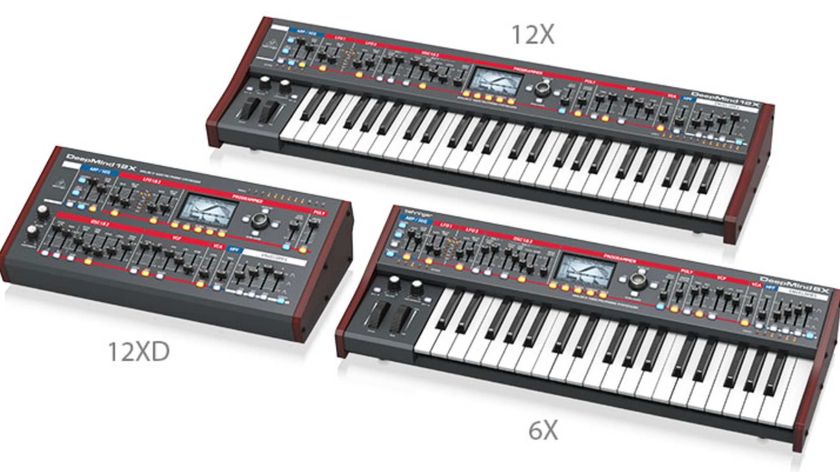The Guthrie Govan World Guitar Day 2019 interview: "I’ve always wanted to write a dinosaur song. All thunderous footsteps, reptilian mating calls and all that stuff!"
The session shredder par excellence on The Aristocrats, Jazzmasters, Brexit, and working with cinema's top composer

WORLD GUITAR DAY 2019: “Funnily enough, one of my favourite things about my signature is that John Mayer bought one,” says British guitar virtuoso Guthrie Govan midway through this catch-up for World Guitar Day, while discussing his main Charvel axe.
Mayer had ended up posting several videos of himself playing the instrument online, with nothing but high praise for its craftsmanship and musicality, pointing out how such tools were not just for shredding…
“It turns out he just tried one and liked the sound of it,” smiles Govan. “That made me happy because though he might not be the target audience for something like that, he found merit in it. I got a proud parent buzz from that story. Someone who knows everything about tone liked the tone of my instrument… wonderful!”
The critically acclaimed and in-demand session guitarist is speaking to MusicRadar from across the pond in between his various live commitments, having completed nine and a half weeks of “Aristocratic madness” and now currently in final rehearsals for Hans Zimmer, with whom he’ll be heading to Asia and Australia.
Not long after that, he’ll be picking things back up with fellow Aristocrats Bryan Beller and Marco Minnemann through Europe, before ending the run in St Petersburg next March. Right now, he laughs, the crystal ball is telling him his future is mainly air miles...
You ended the Aristocrats tour in Los Angeles playing a co-headliner with John 5, who also had Joe Bonamassa making a guest appearance...
“That was quite an adventure and a fun thing. The overlap between the two crowds was probably not that huge, which is a good thing for all concerned, right? And yes, Joe turned up with a ’59 Les Paul. It makes me happy when you actually get to see these old vintage instruments that are normally enshrined in perspex and never enjoyed. He takes them out there so people can hear them!”
Get the MusicRadar Newsletter
Want all the hottest music and gear news, reviews, deals, features and more, direct to your inbox? Sign up here.
Did you get to play it?
“He offered… but I’d just spilled loads of beer all over my hands ha ha! I thought out of respect for this wonderful instrument I should not contaminate it.”
The fourth Aristocrats album arrived earlier in summer. Is that a banjo we hear at one point?
“Ah, that would be the track When We All Come Together, Marco Minnemann’s Irish drinking song. That all happened because of where we recorded, this wonderful little place called Brotheryn Studios in Ojai [in California]. You walk into the live room and it’s basically a guitar museum, full of all these fun things you’d want to pick up and play. There’s Duesenberg mandola, a Duesenberg baritone, the banjo and this trippy surf guitar called a Bilt Corvaire.
"The goal, given it was an overdub-heavy track, was to cram as many of the instruments onto the recording somehow. Welcome to Marco’s mind, I guess! People would be surprised by just how much detail is already there when Marco sends his demos in. His versions of the chords are completely unplayable because he was just multi-tracking. There was layer upon layer of Telecaster clusters and I had to work it out for one guitar!”
All Said And Done features a lot of double-stops and some of your more minimalist, bluesy lines…
“I think when Bryan sent in the demo for that song it was the biggest surprise on the album for me. I think people have come to expect we’ll target some innocent, unsuspecting genre and subvert it and be cheeky with it. But I didn’t expect Bryan to write a Beatles song ha ha! It was quite a startling moment hearing the demo and what he was going for.”
Burial At Sea, on the other hand, feels very progressive and embellished...
“That’s another one of Marco’s. I guess it represents a slight departure for this band. All of his songs for this album came in very formed. He’d done some sound design stuff, like on this track there are recordings of him walking by the sea, capturing all the haunting ship noises and bubbling water. He wanted to build it from that skeleton he’d assembled in Cubase rather than reducing it down to a live trio, no overdubs kind of interpretation. It’s probably the most produced and lavish-sounding track we’ve ever done.”
You know I’ve always wanted to write a dinosaur song. I don’t know what took me so long… finally here it is. All thunderous footsteps, reptilian mating calls and all that stuff!
Terrible Lizard sounds a lot like the Victory V30 in its newer mk.2 mode...
“You know I’ve always wanted to write a dinosaur song. I don’t know what took me so long… finally here it is. All thunderous footsteps, reptilian mating calls and all that stuff! But yes, I was using everything about the V30 which is new. That setting Americanises the sound a little bit. Generally I think of the Victory range as a hot-rodded Marshall kind of thing. The v2 mode is a bit more middle of the Atlantic, there’s a higher mid-range focus. I can’t remember how they did it, I think it was something to do with the different amount of negative feedback around the power stage… but it definitely worked for that track.”
Which mode do you find yourself mainly using these days?
“I’m glad they incorporated the switch so you still have the choice of reverting to the V30 of yesteryear, but when we’re touring live I’m using the new mode all through the gig. It suits me nicely. I guess it’s whatever’s right for the situation – when we got to the song The Ballad Of Bonnie And Clyde, the new voicing wasn’t quite cutting it. In my mind what it needed was some Les Paul-brandishing '70s guitar hero stuff, it was a specific sound. So we thought for the sake of experimentation we’d go round the back, push that button and there it was.”
I just discovered there was something really nice that happens if I use my Charvel guitar, with the single-coil emulation making the guitar as thin, sparkly and glassy as possible, fed into an amp that’s naturally spongy, round and warm
Guthrie Govan on the Vox AC30
Elsewhere on the album, you also utilised a Fender Jazzmaster and Vox AC30?
“Spiritus Cactus was all Fender Jazzmaster, because I have a very nice one floating around in my studio. It’s a funny thing, particularly after all the touring with Hans Zimmer – the other guitar player is Nile Marr, son of Johnny Marr, and he’s a huge Jazzmaster buff. That’s his thing, he collects them and is a bit of authority on how they sound. And I’d never played one until we went into the studio. I felt it was my duty to investigate his world just for one song. It definitely made me play differently. And as for the AC30, I just discovered there was something really nice that happens if I use my Charvel guitar, with the single-coil emulation making the guitar as thin, sparkly and glassy as possible, fed into an amp that’s naturally spongy, round and warm. It felt like a clean tone that was really live and inspiring...”
The kind of tone that might affect what kind of lines you play?
“I’m a big believer in that kind of thing – if you listen to the sound coming out of the speaker, it tells you what kind of player to be. I’m very responsive to how the rig is reacting. It’s nice to meet a new side of myself, especially like how I did towards the end of Last Orders. That all happened because it was an unfamiliar rig.”
Looking at the Hans Zimmer band, at one point you were part of an electric guitar ensemble that included Nile’s father, Johnny Marr, and Mike Einziger from Incubus. Now there’s a line-up few would have expected to see together...
“That’s one of Hans’ weird gifts. He’s a good chemist, he knows which ingredients to combine and obviously he has the world’s biggest phonebook of musicians. The toolkit he has to work there with is enormous. He really likes bringing in people from different fields of music, the whole touring band is basically that. I think that’s what sustains, that’s the whole energy of the band.
"Everyone is good at something – and that something will be different from person to person. No-one gets to be arrogant or act like a dick, everyone’s learning from everyone else. There’s a great energy. It’s the kind of band no-one else would dare to put together because it obviously wouldn’t work… and Hans has the confidence and vision to mix it all together, and out comes that!”
He has this Wagner/Berlioz breadth of vision. Why have 16 French horns when you can have 32. He definitely likes the more is more philosophy!
Guthrie Govan on Hans Zimmer
There’s footage of you using an eight-string in the band…
“I’ve had an eight-string kicking around for a few years. I never thought it suited me... I’m still working out what to do with six strings. When I got the gig with Hans, I had no idea what kind of guitar player he needed for the band. I listened to the whole set on mp3 and I couldn’t hear any guitar. So what should I do on the first day of rehearsals? I brought every weird instrument I could think of: a fretless, an eight-string… And as soon as he saw that eight-string, he fell in love with it. He said, ‘It’s got more strings, you have to use it!’
"He has this Wagner/Berlioz breadth of vision. Why have 16 French horns when you can have 32. He definitely likes the more is more philosophy! So I found a home for it doubling a lot of the lower cello ostinatos, particular in the superhero soundtracks like The Dark Knight Rises and stuff like that. When I next went round to his studio after those rehearsals, he’d bought himself a nine-string. I guess it’s my turn again now! It’s like what happens at the NAMM show for basses every year.”
Anything you play isn’t right or wrong yet, it depends more on where you go with it
Do you ever find yourself playing seven-strings?
“Seven-strings, on the other hand, confuse me... so not really. Maybe I don’t like the odd number of strings. But an eight-string would be a great desert island or prison guitar! If you get stuck with just one thing, it would have a lot to offer. If I had a lot of time, I’d probably move more in a jazz direction trying to work out exciting new chords rather than riffing on the low strings and shredding on the higher ones.”
What was your biggest breakthrough when it comes to the more outside style of playing?
“It’s all a product of what you spend your time listening to. Any time you’re going to try and use an unusual note choice, it has to start from a place where you actually like that note. You’re not doing it just to do a trick like, ‘I’m going to unleash my chromaticism now, then they’ll be terrified!’
"Everyone knows the flat five in the blues scale, you instinctively know how to make it sound like you mean it rather than a mistake or disgusting, discordant note – which is actually what it is. As for the other non-white key notes, you can treat them the same way. Anything you play isn’t right or wrong yet, it depends more on where you go with it.”
Do you find a lot of chromatic concepts work in the same way, regardless of genre?
“Sure, if you listen to those bluegrass licks that feel like 16th notes forever – the excitement for me is almost like watching someone run down a steep hill trying not to trip over. But those outside notes operate in the same way when it comes to bebop licks or Bach partitas for solo violin. You notice there’s a template, almost skeletal version of the line.
"Look at the notes falling in important parts of the musical pulse, generally those are the nice notes reinforcing the chord you are listening to. In between, the chromatic notes add to the sense of movement. I guess if you listen to enough chromatic notes, you start to like them.”
It’s interesting how a lot of the more outside scales can sound quite inside if used in a certain way…
“There are certain Beatles or Sting songs where parts of the melody are completely dependant on melodic minor and because it’s used so well, it doesn’t jar for the listener. There’s a lot of good stuff in that world… but you have to make friends with it!
"For me, it gets really dangerous when I start listening to Turkish or Moroccan music and things like that. They have grey keys in between the white and the black notes. There’s a note between the minor second and major second, another between the minor and sixth. That halfway point is the Arabic interpretation of the right note. If you listen to it enough, you develop a fondness for these notes that don’t actually exist in Western music… you have to rein yourself in and make sure you don’t use them in the wrong context!”
There’s some very tasteful usage of melodic minor in your Drive Home solo with the Steven Wilson band…
“That was another example of me responding to the sound I had. It was actually one of Steven Wilson’s guitars, that turned up in cardboard box, someone had just sent it to him. He didn’t have time to try it out so said, ‘Hey Guthrie, you like weird guitars, check this out!’ It was a Jazzmaster with this Sustainer pickup, which I’d never used before. I thought I’d use it on one of the tracks to get familiar with that kind of guitar. That freaky thing of notes sustaining made me play differently and more conscious of what happens in the lifespan of each note, because it won’t die out where you’d normally expect it to.”
As for another solo album, is it even possible to find the time to think about something like that right now?
“It’s definitely on the to-do list but my world for the next six months is wall-to-wall touring. I can’t see any serious progress being made and honestly I’m okay with that. I’d rather take the things I can do and project them into the world as a guy in a band, rather than being someone on a pedestal surrounded by an anonymous rhythm section.
"I’m excited about The Aristocrats because it’s a democracy and there’s teamwork. There’s a part of my personality that feels more comfortable in that kind of scenario than screaming, ‘Check out my awesomeness!’ at the expense of other musicians. That’s why I’ve prioritised all the touring stuff over the last few years instead of being locked in a cave making Erotic Cakes 2.
"It will happen when it happens… and hopefully it will sound nothing like the first album. Things can co-exist, but I really love going round the world in a van watching our Artistocrats songs become more cohesive every night. We’re become more of a unit in terms of dynamics and how we interact together. It develops with every show. It’s a bit like gardening; you have to nurture everything to watch it flourish.”
It’s a problem if British musicians like myself find it harder to go to Europe; that becomes a cultural loss. It will also result in me bringing less money home to pay tax on in the UK
Guthrie Govan on Brexit
Finally, without getting too political, there’s been a lot of debate over how Brexit might impact touring musicians – costing them more in visa applications and merchandise tax. Do you ever worry about how it might affect you?
“I don’t really see how the current trend is going to help anybody. It’s a weird thing, right now I’m watching from a distance in the US as an unelected maniac is trying to completely change the whole system. Yes, it seems as if anything he is proposing is going to make life harder for musicians. It’s a problem if British musicians like myself find it harder to go to Europe; that becomes a cultural loss. It will also result in me bringing less money home to pay tax on in the UK.
"It’s also a loss for British fans who enjoy live music – bands from elsewhere may very well decide crossing the water is more trouble than it’s worth, going over to that crazy island. I don’t know what’s happening, it seems like the engineers of all of this don’t really know what’s happening either. Hopefully they will throw their hands up in defeat and say, ‘You know what, maybe we were a little overambitious there, let’s reassess!’”
The Aristocrats' You Know What...? is out now. Order it it here.
See The Aristocrats' tour dates for 2019 and beyond here.
Amit has been writing for titles like Total Guitar, MusicRadar and Guitar World for over a decade and counts Richie Kotzen, Guthrie Govan and Jeff Beck among his primary influences. He's interviewed everyone from Ozzy Osbourne and Lemmy to Slash and Jimmy Page, and once even traded solos with a member of Slayer on a track released internationally. As a session guitarist, he's played alongside members of Judas Priest and Uriah Heep in London ensemble Metalworks, as well as handling lead guitars for legends like Glen Matlock (Sex Pistols, The Faces) and Stu Hamm (Steve Vai, Joe Satriani, G3).

“Those arpeggios... That was the sickest thing I ever heard”: Yngwie Malmsteen on why guitarists should take inspiration from players of other instruments if they want to develop their own style

“I used a flange on the main riff and a wah-wah on the solo. I just said, ‘Hit the record button and I’ll let it rip!’”: Kiss legend Ace Frehley on his greatest cult classic song












